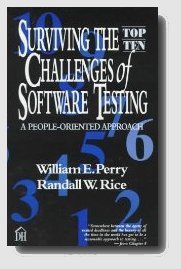I have been writing and speaking on the topic of living and working in a global economy since 2000. If you are not familiar with the concept of a flat world, then I suggest you read the book featured in this month's book review, The World is Flat.
This topic is perhaps one of the most important for anyone who works in a job that can be outsourced. Software testers and developers are prime targets for outsourcing, especially since these professions are being reduced to commodities in many organizations.
My perspective in this article is unapologetically from the U.S. standpoint, since that is where I live and work. Most of the people I serve are in the U.S. If you are reading this article as a native of India, China, or other country, you may find this an interesting perspective of how globalization is impacting technical workers in the U.S. In addition, these issues are not just impacting the U.S. For example, Mexico was blindsided by China in undercutting manufacturing labor costs. Some Indian outsourcing companies have started outsourcing work to other countries. Think of that - you are working for an Indian outsourcer and lose your job because someone in China can do it cheaper and/or better!
This article is not meant to be a condemnation of people or practices in other countries, as these issues will impact everyone no matter where you live.
Survival Strategies
The good news is that there are some things you can do today to prepare for the wave of change that is on the horizon. I have been applying these strategies personally and I suggest you consider them as well.
Learn to Become Very Flexible
Most people dislike change. To survive in a global marketplace, you will need to embrace change. In fact, you will need to anticipate change and be proactive instead of reactive. For example, if you are a tester performing mainly functional tests in a technical project team, you may have to become adept at gathering and writing user requirements.
Become a Really Adaptable Person
The rule used to be that value is created by specialization. You could be a test automation specialist working with a certain brand of test tool and occupy a very nice niche. The problem with that strategy now is that specialties can be outsourced easily. You need to be a person that can do many specialized and new things very well. In addition, you need to learn how to learn new things and be on the front of the adoption curve. This is different from being a generalist, who does many things at a basic level.
Work in Jobs that are Anchored Geographically
An anchored job is one that must be done locally. An example would be the oil change shop down the street. Of course, I'm not advocating you start working on cars for a living. What I am saying is that you do things that can only be done locally, such as gathering user requirements or validating a system from the business perspective.
The reason requirements gathering is an anchored job is that you can only do so much data gathering from a distance. Consider that over half of interpersonal communication is non-verbal. You pick up cues from body language. While it is possible to gather some requirements at a distance, you probably will not get them all that way.
Another example is testing a system from a business or user perspective. This is what I call "getting on the business side of the house".
Add Extra Value
There was a time when all you had to do to keep your job was to show up for work on time and do a decent job. The concept of corporate loyalty is gone today. After decades of layoffs, mergers and pension fund scandals, companies have burned people to the extent that the trust is gone. Employees may feel some loyalty to their employer, but as an employee you can no longer assume the company will be loyal to you. The bottom line is no matter where you work, you only get paid for the value you bring to the marketplace.
In a global marketplace, you will not be able to compete on wage value alone. There are too many people around the world who can do what you do cheaper and perhaps better. To survive, you must do what you do in a very distinctive and valuable way.
One of the biggest reasons companies outsource a job is to get rid of a problem. Companies may not be quite so quick to outsource something that is working well.
Regardless of where you work, you must make the individual decision to add value in multiple ways to what you do. If you are a tester, you must do things such as be a mentor, be a team player, do many other jobs well, understand the business, speak the language of the business, etc.
Summary
I will not predict how the whole outsourcing and offshoring thing will play out. I do know that it is a wave that has been hitting for some time already and will likely get much larger.
Not every organization will outsource their IT work. Some organizations can't outsource due to unique needs, such as security, etc. Other organizations will find it very difficult to outsource because they can't manage projects internally, yet alone externally.
However, with all this said, we are facing a shift of global business not seen since the industrial revolution. We all need to be prepared to make the transition, regardless of where we live.
The people providing services in other countries are not the enemy. We are simply facing a new way of living and working which is increasing competition on a global scale. We can and must rise to the challenge. We can either build walls to keep the jobs here temporarily, or we can compete and build a higher level of value. It will not be an easy transition, but I personally feel the competition strategy is the one with the best long-term promise. In many ways, we will not have a choice but to adapt to this changing world.
Bio
Randall Rice is a leading author, speaker and consultant in the field of software testing and software quality. Randy has 40 years experience building and testing mission-critical projects in a variety of environments and is co-author of the book, Surviving the Top Ten Challenges of Software Testing. He is the author and instructor of Testing SOA and Structured User Acceptance Testing courses, presented by Rice Consulting Services. You can contact Randall through his web site at www.riceconsulting.com.

 Can't travel? Don't want to travel? Check out the new live virtual schedule and e-Learning courses!
Can't travel? Don't want to travel? Check out the new live virtual schedule and e-Learning courses!
 Training and Consulting in CyberSecurity Testing - Self-paced e-Learning for ISTQB Advanced Security Tester.
Training and Consulting in CyberSecurity Testing - Self-paced e-Learning for ISTQB Advanced Security Tester.  We have over 30 e-learning courses available on demand!
We have over 30 e-learning courses available on demand!  ISTQB Accredited Training - Foundation Level, Advanced Levels and ASTQB Mobile Tester Certifications.
ISTQB Accredited Training - Foundation Level, Advanced Levels and ASTQB Mobile Tester Certifications.  E-Learning available anytime!
E-Learning available anytime! Need Expert Guidance in Software Testing and QA? That's What We Do!
Need Expert Guidance in Software Testing and QA? That's What We Do! Training and Consulting in Testing Mobile Applications - ASTQB Certified Mobile Tester Training
Training and Consulting in Testing Mobile Applications - ASTQB Certified Mobile Tester Training Confused by Requirements? We Have Answers! IQBBA Training
Confused by Requirements? We Have Answers! IQBBA Training Special Pricing for Federal, State and Local Governments
Special Pricing for Federal, State and Local Governments
Rice Consulting Services specializes in software testing training, software testing consulting, and independent testing. We equip you to test your systems better and faster so you can focus on your business instead of technology problems.
With over 30 years experience in building and testing IT systems, we can bring the expertise you need to be successful in meeting your business goals and increasing profits.

